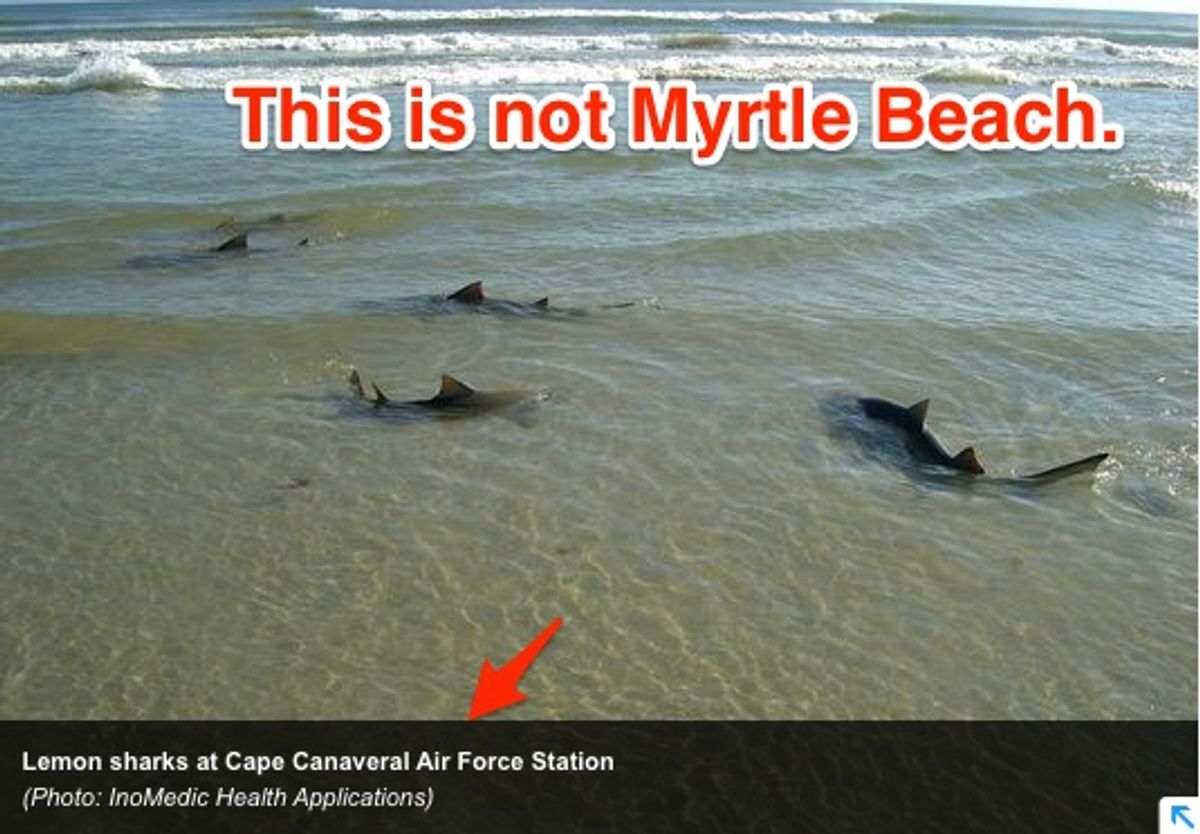NEWS: Social media warnings are circulating about an increase in sharks in Myrtle Beach, South Carolina.
In late June and early July 2015, rumors about sightings of sharks in Myrtle Beach, South Carolina, reached a fever pitch on social media. Images purportedly showing several sharks in bathing areas caused concern for prospective beachgoers on Facebook and Twitter:
Sharks at Myrtle Beach yesterday. All along eastern seaboard. pic.twitter.com/CCEyEbDMnJ
— Bruno (@CorporalBruno) July 1, 2015
As is often the case with such rumors, a grain of truth inspired them, while and a lack of context propelled them. On 29 June 2015, Myrtle Beach television station WMBF published an article titled "Shark expert clears misconceptions following recent shark bites," in which the station spoke to Charleston marine biologist Arnold Postell about whether sharks were indeed appearing (and noshing upon) bathers in the Myrtle Beach area with increased frequency:
Over the weekend, a man was bitten while in the water in the Outer Banks in North Carolina. Another man was bitten in the water at Hilton Head, South Carolina. Authorities say both were taken to the hospital with non life threatening injuries.
Earlier this month, two separate incidents happened on the same day. Both victims were teens and each lost an arm after being bitten by a shark in Oak Island, North Carolina.
Postell says sharks are not seeking humans out to eat, rather, it's simply mistaken identity. For that reason, Postell says calling these encounters "shark attacks" is incorrect.
WMBF added that should risk of shark bites meaningfully increase, officials would step in to issue alerts or close beaches:
At this time, no Lowcountry beaches have considered closing or temporarily banning fishing because of recent shark encounters.
The Public Safety Officials with the police departments would make the decision to close beaches of there was a credible threat to the public.
Raleigh station WRAL also consulted an expert in marine life to determine whether shark incidents had increased in the waters off South Carolina in 2015:
"It's hard to draw a pattern out of six instances," said Joel Fodrie, an assistant professor at the University of North Carolina at Chapel Hill's Institute of Marine Sciences in Morehead City. "Those events have ranged from near our southern border to our northern border in the state, so you're talking about very different environments, different temperatures."
Fodrie said that, if you're in the ocean, there's a good chance sharks are lurking in the water nearby. But despite the alarming number of attacks this summer, he said the chance of getting bitten is relatively low.
As for the uptick in shark reports on social media sites, most of those shares were of the friend-of-a-friend variety. But one of the top tweets on the subject (embedded above) was provably false: The photograph claimed to be a recent snapshop taken by "family" visiting Myrtle Beach was in fact swiped from what appeared to be a stock photograph published to the Florida Today web site in August 2014 alongside an article titled "Shark Week's over, but sharks are still in the water." The sharks in that tweet were definitively not spied in 2015 or at Myrtle Beach, as the shot was taken at Cape Canaveral in a previous year.
